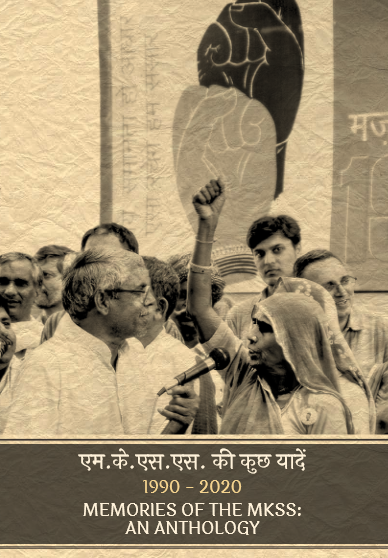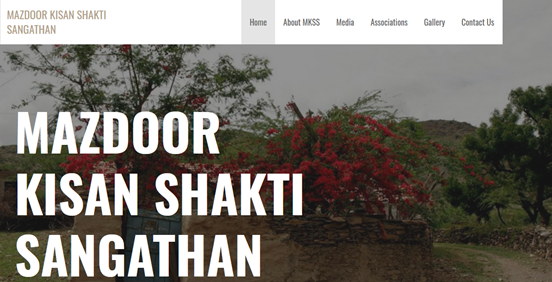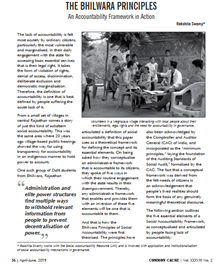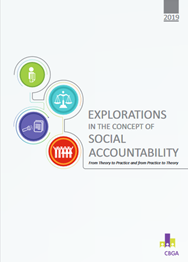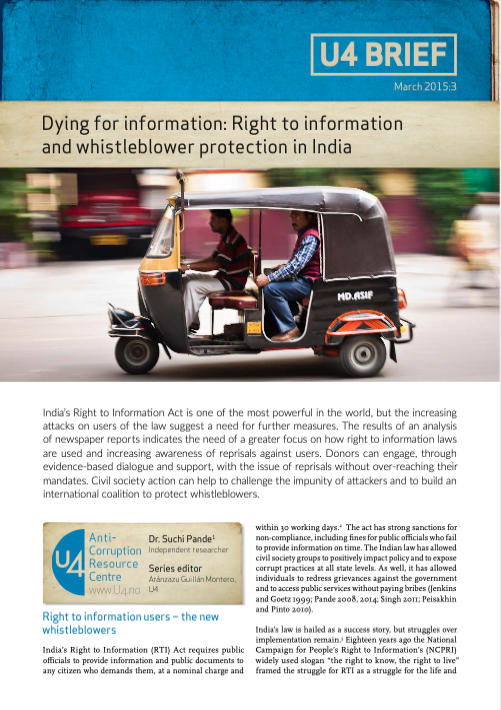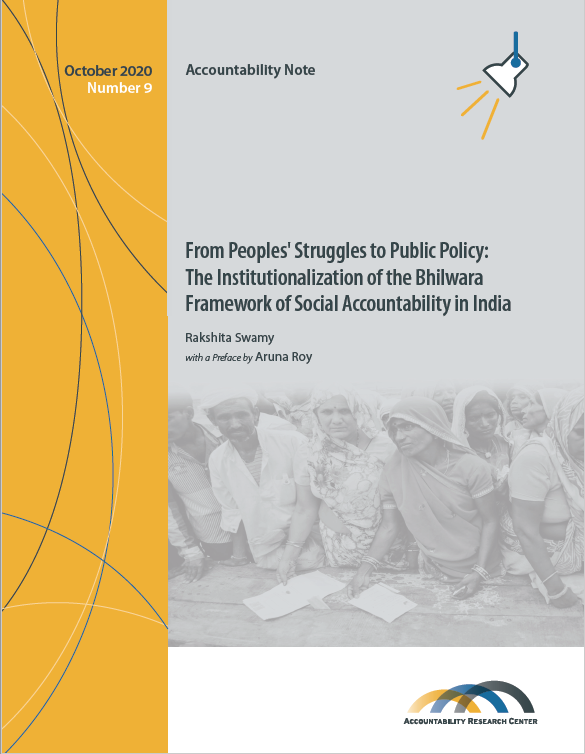
From Peoples' Struggles to Public Policy: The Institutionalization of the Bhilwara Framework of Social Accountability in India
Date: October 2020
Author(s): Rakshita Swamy, with a preface by Aruna Roy
Publication type: Accountability Note
Published by: Accountability Research Center
This Accountability Note describes and explains a set of principles for social accountability that emerged out of the struggles of some of the most marginalized people in India. Although firmly rooted in the experience of local resistance, the Bhilwara Framework of Social Accountability speaks directly to national and global struggles for accountability. The essential elements of the Bhilwara Framework were first framed by Dalit activists fighting discrimination and structural injustice, who reflected on and theorized about the causes of their marginalization. These elements were then accepted, developed further, and disseminated by activists and social movements. This Note discusses the social origins of the Bhilwara Framework and explains how each of the six principles was derived and applied. The principles include:
- Access to meaningful and usable information;
- The formal registration of citizen grievances;
- The need for time-bound inquiry processes;
- Platforms for citizen participation;
- Protection of complainants against reprisal; and
- Public and collective spaces in which citizens can dialogue with their state.
This Note also describes how the Framework was refined and expanded, and how it was consequently institutionalized within the state. Unlike most activists’ agendas, the Bhilwara Framework has made the transition from concept to policy. India’s Supreme Audit Institution and Comptroller and Auditor General used the Bhilwara Framework to develop a set of minimum standards for social audits. The Framework has also been used to frame state and national policies on accountability for social justice and security for Dalits, rights holders accessing their entitlements under the right to work, food security, education, etc., urban poor workers, and other marginalized groups. It also informs an ongoing attempt to draft a legal framework for accountability by the Rajasthan State Government, a fitting tribute to where the struggle for these principles began. The Framework has helped define and develop the practice of ‘independent facilitation,’ which refers to the efforts made by the State to provide institutionalized platforms, institutions, and processes for enabling citizens to hold the State to account, that are independent of the latter’s control and interests. Similar breakthroughs have been made in contemporary grievance redress reforms. Recognizing that complainants will face difficulty and perhaps intimidation while registering a grievance at the very office that is the cause of the grievance, the Bihar Public Grievance Redress Law mandates Information and Facilitation Centers to provide single window support centers for information, to register grievances and track their status, an independent officer to hear appeals, and a wide scope in the definition of a complaint. The Framework served as the point of reference for State and civil society jointly building the country’s first web portal for mandatory disclosure of information (the Jan Soochna Portal). It has played an instrumental role in forming the basis of wider conceptions of social audits in tribal autonomous regions, labor welfare schemes and corrective or rehabilitation institutions run by the State. These interconnected efforts have emerged from concerted grassroots struggles and refined by social movements and ordinary citizens and users of India’s various rights-based legislation. These essential struggles deepen social accountability strategies, rooting them firmly in social justice and participatory democracy.

Rakshita Swamy leads the Social Accountability Forum for Action and Research (SAFAR) based out of the National Law School of India University. SAFAR aims to work with citizen groups and governments to embrace, learn, demonstrate and advocate for the institutionalization of social accountability mechanisms such as pro-active disclosure of information, grievance redress, social audits, citizen facilitation and time-bound grievance redress. She has worked with civil society organizations, campaigns, movements and Government Departments in the States of Rajasthan, Karnataka, Kerala, Meghalaya, Chhattisgarh, Maharashtra and Delhi on learning and collaboratively developing accountability mechanisms across programs for social security, urban governance, rights of unorganized labor such as construction workers and waste pickers; use of information technology in governance; extractive industry; and Social Audits in 6th Schedule Areas, amongst others. Prior to this, she worked with the Ministry of Rural Development, Government of India for 5 years, where she was responsible for facilitating the institutionalization of social audits in the Mahatma Gandhi National Rural Employment Guarantee Act and drawing synergies between social audits and the formal audit undertaken by the Supreme Audit Institution (SAI) of the country. She served as the Convenor of the Task Force that developed the world’s first Auditing Standards of Social Audit, jointly endorsed by Government and the SAI. She has been an honorary member of the Mazdoor Kisan Shakti Sangathan (MKSS) and the National Campaign for Peoples’ Right to Information since 2010. She holds a Master’s in Social Policy and Development from the London School of Economics. Aruna Roy is a socio-political activist and Founder-Member, Mazdoor Kisan Shakti Sanghathan (MKSS), National Campaign to People’s Right to Information (NCPRI), and the School for Democracy (SFD). She was with the Indian Administrative Service from 1968-1975. In 1975 she came to Ajmer District, Rajasthan to work with the SWRC and the rural poor. In 1987 she moved to live with the poor in a village called Devdungri, Rajsamand District, in Rajasthan. In 1990 she was part of the group that set up the MKSS. She has worked for accessing constitutional rights for the poor—Right to Information, Employment, Food Security, etc. She was a member of the National Advisory Council from 2004-06 and 2010-13. She was a member of the steering committee of the Open Government Partnership (OGP) until 2014. She is President of the National Federation of Indian Women (NFIW). She was the 2016 Professor of Practice at McGill University ISID, Montreal, Canada, and the 2016 George Soros Visiting Practitioner Chair at Central European University, Budapest. Awards include the Ramon Magsaysay Award in 2000, the Nani Palkiwala Award, and the Lal Bahadur Shastri National Award. She was listed as one of the 100 most influential people in the world by TIME Magazine for 2011.

